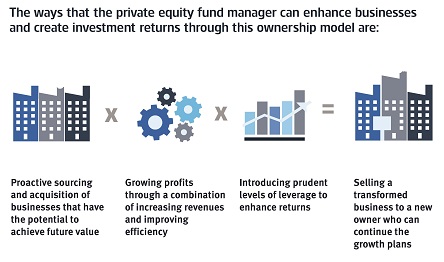What is private equity?
Private equity refers to investments in companies that are privately owned rather than publicly listed on a market such as the London Stock Exchange.
The global private equity market contains around five times more companies than public equity markets. Plus companies are generally staying private for longer. So, there’s a huge universe to choose from.
However, a lack of public information makes researching and selecting private companies challenging. Which is why many investors turn to private equity funds.
Existing investors
Access and manage your account through our online portal.
Potential benefits of private equity funds
Private equity funds are professionally-managed funds that look to research and take stakes in private companies with compelling growth potential.
By buying shares in a private equity fund, an investor typically gets exposure to eight to 14 different underlying companies.
abrdn Private Equity Opportunities Trust takes this diversification further. By investing alongside 13 core European private equity firms, in around 50 private equity funds and 20-30 co-investments, we effectively give investors exposure to 600 underlying private companies.
How private equity funds invest
A private equity fund manager acts as a partner to each company they invest in – focusing on developing, growing and in some cases repositioning the business, away from the glare of public stock markets.
Once the goals for the company have been achieved – typically over a defined period of, say, five years – the manager will look to realise the company’s greater value by selling it on. Portfolio companies may be sold to
another private equity firm (a ‘financial buyer’) or to a company looking to expand (a ‘trade buyer’). Or value may be realised by selling its shares on the public stock market through an initial public offering (‘IPO’).
APEO can reinvest, but the underlying fund has to distribute exit proceeds.
Please note: As with buying shares in any company, the value of shares in abrdn Private Equity Opportunities Trust or the dividends paid out are not guaranteed and can go down as well up. You may get back less than you invest.
How private equity funds can generate returns
There are three ways that a private equity fund manager may look to enhance a business before selling it to realise its value.
